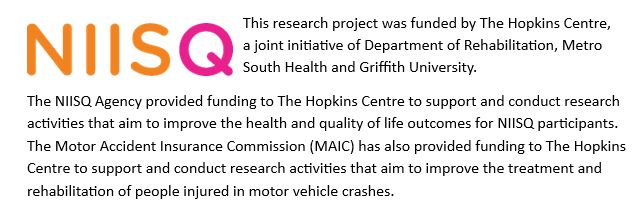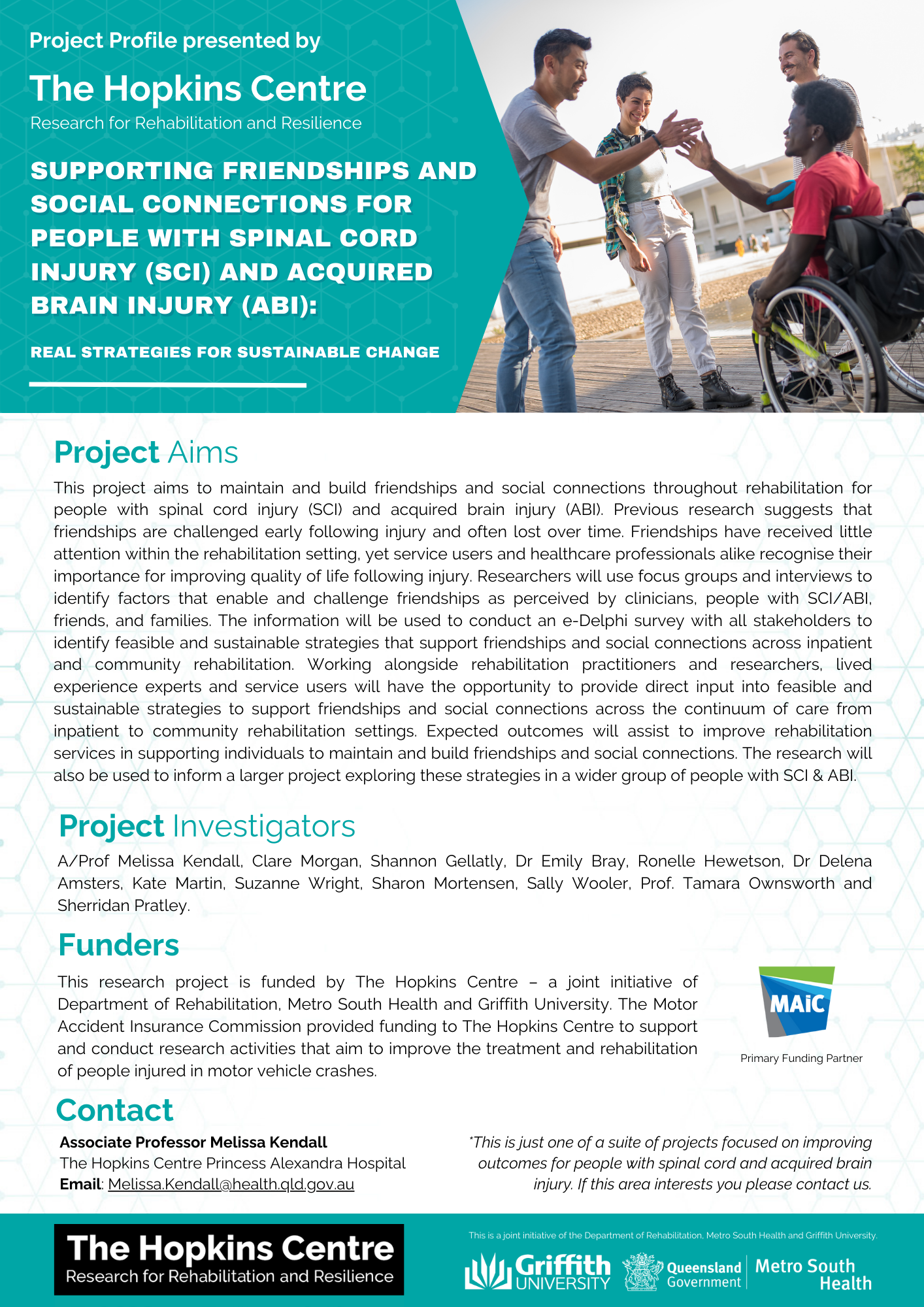SEED PROJECT - Supporting Friendships and Social Connections for People with Spinal Cord Injury (SCI) and Acquired Brain Injury (ABI): Real Strategies for Sustainable Change.
About the Project
About the Project
Chief Investigator: Associate Professor Melissa Kendall
Project Title: Supporting Friendships and Social Connections for People with Spinal Cord Injury (SCI) and Acquired Brain Injury (ABI): Real Strategies for Sustainable Change
Project Team: Clare Morgan, Shannon Gellatly, Dr Emily Bray, Ronelle Hewetson, Dr Delena Amsters, Kate Martin, Suzanne Wright, Sharon Mortensen, Sally Wooler, Prof. Tamara Ownsworth and Sherridan Pratley.
Background:
Friendships are a basic human right and a significant part of peoples’ lives. Social connections are integral to social and community participation as well as identity reconstruction following spinal cord injury (SCI) and for psychological well-being and identity after acquired brain injury (ABI). Yet, social connections may be compromised following injury through a loss of old friends and the challenge of making new friends. Friendships have not been addressed broadly in rehabilitation practice and evidence-informed rehabilitation interventions have been limited or focused primarily on peer support.
Grounded theory studies in both SCI and ABI have identified the role of both injury-related and social environmental factors in friendships. Further, the importance of understanding temporal processes of maintaining and rebuilding friendships have been highlighted, suggesting interventions consider the entire rehabilitation continuum. Further work is needed to develop rehabilitation approaches to facilitating friendship and social connection across the continuum and improve social participation and psychological outcomes after injury.
Project Summary:
This project aims to maintain and build friendships and social connections throughout rehabilitation for people with spinal cord injury (SCI) and acquired brain injury (ABI). Previous research suggests that friendships are challenged early following injury and often lost over time. Friendships have received little attention within the rehabilitation setting, yet service users and healthcare professionals alike recognise their importance for improving quality of life following injury. This study will occur in 3 phases.
Phase 1
Researchers will use focus groups and interviews to identify factors that enable and challenge friendships as perceived by clinicians, people with SCI/ABI, friends, and families.
Click here to view the project flyer for Phase 1.
Phase 1 update
Phase 1 focus groups and interviews are complete.
- A total of 50 participants (n=50) were involved in this phase of the research.
- Manuscript is in preparation for this Phase.
Phase 2
The information will be used to conduct an e-Delphi survey with all stakeholders to identify feasible and sustainable strategies that support friendships and social connections across inpatient and community rehabilitation.
Phase 2 update
- HREC approval obtained (MSH and GU)
- MSH governance approval obtained with new contract (>4 months)
- Regular consultation across the research team through both formal meetings and regular email correspondence
- Draft survey platform developed in REDCAP on basis of Phase 1 findings and trialled with one person with SCI and one person with ABI
- Final survey platform developed for Round 1 survey with iterative input from research team
- Survey made live and data collection for Phase 2, Round 1 survey completed
- Round 1 survey findings shared with research team and draft framework in development.
- Phase 2, Round 2 survey data collection completed.
- Round 2 survey findings shared with research team.
- Translational framework entitled ‘Staying Connected’ developed along with an action plan
- Resources associated with the framework are under development including written online resources, a brief 5 minute video, visual posters and a staff checklist.
Analysis of Phase 2 data informs us that, while there are many possible strategies to enhance friendships following injury, there are a more limited number that are feasible to both implement and maintain without significant resources. Furthermore, there is significant heterogeneity among individuals about what is considered appropriate and useful. What one person may feel is necessary, another may feel is inappropriate. This speaks to the need for person-centred care where individuals are encouraged to exercise choice and control over how friendships are managed.
Education, communication and documentation appear to be clear areas of focus. Strategies such as having explicit protocols (e.g. staff checklists), creating supportive environments (e.g., more private inpatient spaces), educating key stakeholders (e.g., people with injuries, families, support workers, rehabilitation staff and funding providers) and identifying key support people are all important, with varying degrees of feasibility.
Phase 3
Working alongside rehabilitation practitioners and researchers, lived experience experts and service users will offer the opportunity to provide direct input into feasible and sustainable strategies to support friendships and social connections across the continuum of care from inpatient to community rehabilitation settings. This phase will include small trials of the framework and resources with:
- 3 x persons with SCI (including a family member/friend, one inpatient and one community rehabilitation staff member) and
- 3 x persons with ABI (including a family member/friend, one inpatient and one community rehabilitation staff member)
Expected outcomes will assist to improve rehabilitation services in supporting individuals to maintain and build friendships and social connections. The research will also be used to inform a larger project exploring these strategies in a wider group of people with SCI & ABI.
Phase 3 update
- MSH HREC approval obtained
- GU HREC and MSH governance approval in process
We look forward to sharing more about this research and how it progresses research objectives and agenda in The Hopkins Centre Evidence-Based Practice and Community Supports Program.
This is a joint initiative of the Department of Rehabilitation, Metro South Health and Griffith University.

View All Researchers


